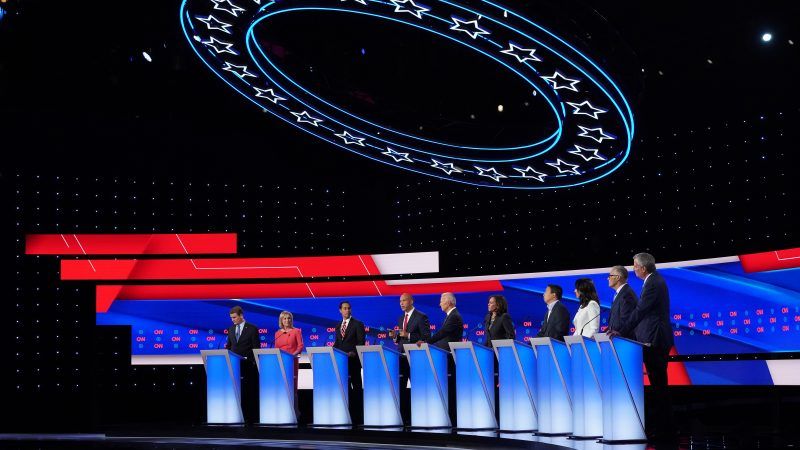Democrats Debate To Determine Who Will Spend Us Into Oblivion
The idea that "deficits don't matter" has been growing among Trump-supporting Republicans. Democrats are preparing to take full advantage.

The idea that "deficits don't matter" has been growing among Trump-supporting Republicans now that the president has agreed to a budget-busting spending deal. If you don't know what's wrong with that concept, then I hope you watched last week's Democratic debates, where such thinking was taken to new levels.
For several excruciating hours, 20 presidential candidates detailed their plans for the country. Most of them involved spending hundreds of billions of dollars on new programs. I was appalled, but those who shrug at debt spending can't take issue with the Democrats' logic.
One conservative news site tallied the proposed spending from the Democratic candidates at $210 trillion. Even if the analysis is over stated, that bout of plan-itis, as one commentator called it, will bury our nation in red ink. But how do you oppose the Green New Deal, or a plan to help buy people homes, or Medicare for all, or reparations for slavery, if you're not worried about running up the debt beyond its current eye-popping $22 trillion?
Picking on these candidates' spending (and tax and regulatory) plans, some of which will go away as the eventual nominee tacks to the center, is child's play. Today's column will attempt something more difficult: finding positive aspects from the two-night political show. In all seriousness, there were a handful of illuminating moments mixed in with the troubling programs that would, say, deny Americans the right to private healthcare.
Some observers thought the format was ridiculous because it featured so many candidates rather than a handful of front-runners. But the most mind-numbing debates usually come in the general election, when two candidates face off. That's because each party's nominee has a real shot at winning, so they stick to their script, focus on banalities and try not to say anything stupid.
These freewheeling debates feature longshot candidates, who sometimes raise critical issues because they have nothing to lose. Had only former Vice President Joe Biden and U.S. senators Bernie Sanders (I–Vt.), Elizabeth Warren (D–Mass.) and Kamala Harris (D–Calif.) been on the stage, we never would have seen the two best moments from Tuesday and Wednesday nights.
First, some candidates want to reconsider the nation's often-unjust tough-on-crime policies. The best exchange came when U.S. Rep. Tulsi Gabbard (D–Hawaii) expressed concern about Harris' record as California attorney general: "There are too many examples to cite, but…she blocked evidence that would have freed an innocent man from death row until the courts forced her to do so." Gabbard also needled Harris for locking up 1,500 people for marijuana violations "and then laughed about it when she was asked if she ever smoked marijuana." Bravo.
Harris has been running as a criminal-justice reformer, but her record as a drug warrior and "lock 'em up" prosecutor stands in glaring contrast with her current claims. Biden couldn't have zinged her like that given his own record as author of a now-controversial crime bill.
Indeed, the second-most enlightening exchange on that topic came when Sen. Cory Booker (D–N.J.) blasted Biden for that crime bill: "This is one of those instances where the house was set on fire and you claimed responsibility for those laws. And you can't just now come out with a plan to put out that fire. We have got to have far more bold action on criminal justice reform."
Some of Booker's rhetoric was bizarre ("you're dipping into the Kool-Aid and you don't even know the flavor"), but the point was critical. Finally, politicians—including some on the Republican side—are looking at the unintended consequences of federal crime policy.
Second, the candidates had a surprisingly decent discussion about foreign policy on the first debate night. Sanders sounds like an old-line leftist whose views make my skin crawl, but he rightly took jabs at the idea of endless American interventionism. "We have been in Afghanistan I think 18 years, in Iraq 16 or 17 years. We have spent $5 trillion on the war on terror," he said. "And there are probably more terrorists out there now than before it began."
Warren echoed some similar points. The candidates who more closely defended America's current military approach—former Gov. John Hickenlooper of Colorado and U.S. Rep. Tim Ryan (D–Ohio) have a ballpark zero chance of gaining the nomination. Moderator Jake Tapper noted that Sanders' view on the matter is remarkably similar to that of Donald Trump, who "has argued that the United States cannot continue to be the, quote, 'policeman of the world.'" Once again, both parties are re-evaluating policies that have usually gone unquestioned.
Beyond that, the debates offered thin gruel and not much entertainment beyond Sen. Kirsten Gillibrand's (D–N.Y.) pledge to "Clorox the Oval Office." Overall, the two-night Democratic spend-a-thon left me screaming at the wall ("What about the deficits?") and searching for my own form of disinfectant, which I found in the liquor cabinet.
The column was first published in the Orange County Register.
